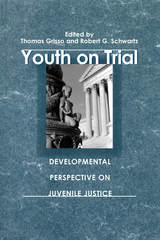2 books by Grisso, Thomas

Double Jeopardy
Adolescent Offenders with Mental Disorders
Thomas Grisso
University of Chicago Press, 2004
In the twenty-first-century world of juvenile justice policy and practice, nearly everyone agrees that one of the most pressing issues facing the nation's juvenile courts is their proper response to delinquent youths with mental disorders. Recent research indicates that about two-thirds of adolescent offenders in juvenile justice facilities meet the criteria for one or more mental disorders. What are the obligations of our juvenile justice system, then, as the caretaker for delinquent youth with such disabilities? How do issues of adolescent development create special challenges in determining the court's proper response to delinquents with special mental health needs? Thomas Grisso considers these questions while offering new information to assist the juvenile justice system in its responses to the needs of our children.
Double Jeopardy considers the newest data on the nature of youths' mental disorders—their relationships to delinquency, the values and limits of methods to treat them, and the common patterns of adolescent offending. That information is used to chart a rational course for fulfilling the juvenile justice system's duty—as a custodian of children in need of health care, as a legal system promoting fairness in youth adjudication, and as a protector of public safety—to respond to delinquent youths' mental disorders. Moreover, Double Jeopardy provides a scientific yet practical foundation for lawmakers, judges, attorneys, and mental health care professionals, as well as researchers who must fill the knowledge gaps that limit the juvenile justice system's abilities to meet youths' mental health needs.
Double Jeopardy considers the newest data on the nature of youths' mental disorders—their relationships to delinquency, the values and limits of methods to treat them, and the common patterns of adolescent offending. That information is used to chart a rational course for fulfilling the juvenile justice system's duty—as a custodian of children in need of health care, as a legal system promoting fairness in youth adjudication, and as a protector of public safety—to respond to delinquent youths' mental disorders. Moreover, Double Jeopardy provides a scientific yet practical foundation for lawmakers, judges, attorneys, and mental health care professionals, as well as researchers who must fill the knowledge gaps that limit the juvenile justice system's abilities to meet youths' mental health needs.
[more]

Youth on Trial
A Developmental Perspective on Juvenile Justice
Edited by Thomas Grisso and Robert G. Schwartz
University of Chicago Press, 2000
It is often said that a teen "old enough to do the crime is old enough to do the time," but are teens really mature and capable enough to participate fully and fairly in adult criminal court? In this book—the fruit of the MacArthur Foundation Network on Adolescent Development and Juvenile Justice—a wide range of leaders in developmental psychology and law combine their expertise to investigate the current limitations of our youth policy. The first part of the book establishes a developmental perspective on juvenile justice; the second and third parts then apply this perspective to issues of adolescents' capacities as trial defendants and questions of legal culpability. Underlying the entire work is the assumption that an enlightened juvenile justice system cannot ignore the developmental psychological realities of adolescence.
Not only a state-of-the-art assessment of the conceptual and empirical issues in the forensic assessment of youth, Youth on Trial is also a call to reintroduce sound, humane public policy into our justice system..
Contributors: Richard Barnum, Richard J. Bonnie, Emily Buss, Elizabeth Cauffman, Gary L. Crippen, Jeffrey Fagan, Barry C. Feld, Sandra Graham, Thomas Grisso, Colleen Halliday, Alan E. Kazdin, N. Dickon Reppucci, Robert G. Schwartz, Elizabeth Scott, Laurence Steinberg, Ann Tobey, Jennifer L. Woolard, Franklin E. Zimring
Not only a state-of-the-art assessment of the conceptual and empirical issues in the forensic assessment of youth, Youth on Trial is also a call to reintroduce sound, humane public policy into our justice system..
Contributors: Richard Barnum, Richard J. Bonnie, Emily Buss, Elizabeth Cauffman, Gary L. Crippen, Jeffrey Fagan, Barry C. Feld, Sandra Graham, Thomas Grisso, Colleen Halliday, Alan E. Kazdin, N. Dickon Reppucci, Robert G. Schwartz, Elizabeth Scott, Laurence Steinberg, Ann Tobey, Jennifer L. Woolard, Franklin E. Zimring
[more]
READERS
Browse our collection.
PUBLISHERS
See BiblioVault's publisher services.
STUDENT SERVICES
Files for college accessibility offices.
UChicago Accessibility Resources
home | accessibility | search | about | contact us
BiblioVault ® 2001 - 2024
The University of Chicago Press









